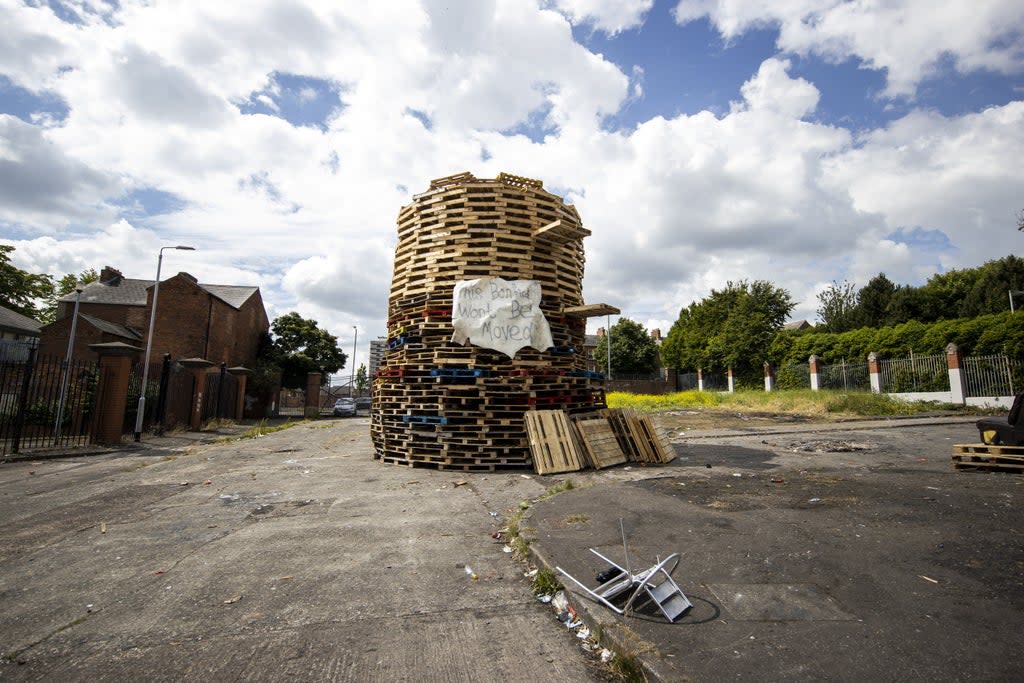Judge dismisses bid for court challenge over ministers’ failed PSNI legal action

A proposed court challenge against two Stormont ministers for taking a failed legal action against the police has been refused.
High Court judge Mr Justice Scoffield dismissed an application for leave to judicially review the actions of Infrastructure Minister Nichola Mallon and Communities Minister Deirdre Hargey last summer.
He said the application made by loyalist activist Jamie Bryson was “academic”, as the 2021 legal dispute between the PSNI and the ministers is now over.
In July last year, the ministers launched proceedings against the PSNI, challenging its decision not to intervene to assist in the removal of a contentious “Eleventh Night” bonfire in the loyalist Tiger’s Bay area of north Belfast.

The case was rejected by a High Court judge in a late-night emergency hearing days before the bonfire was due to be lit.
Mr Bryson, who represented the bonfire builders in last year’s dispute, had sought a judicial review against the two ministers, contending they should have secured the approval of the wider Stormont Executive before taking legal action against the PSNI.
Justice Scoffield, ruling on whether to grant leave for a full hearing, said the applicant had established an arguable case that the ministers had acted unlawfully.
However, he said that, as the ministers had ultimately failed in their legal action, and the bonfire had long since been lit, there was no justifiable practical purpose for hearing a judicial review.
“I dismiss the applicant’s application for leave to apply for judicial review,” he said.
“In my judgment, the case is properly to be viewed as academic and there is insufficient reason for the court to exercise its discretion to proceed to hear the case, notwithstanding the interesting issues that raises.
“If and in the event that an Executive minister is again considering initiating judicial review proceedings against the PSNI or another public authority, such as another minister, no doubt further consideration will be given to the themes which the applicant had hoped these proceedings might address.”

He added: “This application will no doubt have been of some utility in ensuring that, where a minister was considering such a step, this issue will be given careful consideration in advance.”
Under Stormont rules, issues deemed “significant and controversial” should be dealt with by the power-sharing Executive as a whole.
Issues that cut across the responsibilities of multiple departments should also be brought to the Executive under the terms of the ministerial code.
Mr Bryson had argued that taking the PSNI to court over the bonfire was significant, controversial and cross-cutting, and that the ministers were therefore acting unlawfully by proceeding without first securing the approval of other ministerial colleagues.
He had asked the court to prohibit the ministers taking such action in the future without Executive approval and also issue a declaration clarifying the legal position.
The ministers’ barrister, Neasa Murnaghan QC, had acknowledged there was an arguable case in respect of the bonfire dispute being significant and controversial.
However, she rejected the claim that it was cross-cutting and argued that the ministers had acted together in the PSNI legal challenge to save public money.
Moreover, she said the basis of Mr Bryson’s challenge was academic because the events of last July are over and the ministers had ultimately failed in their legal action.

Justice Scoffield agreed with that contention and said the case had not reached the threshold of exceptionality that allows the court to hear cases otherwise deemed academic.
Reacting to the ruling, Mr Bryson said he intended to take his case to the Court of Appeal.
“Our view is, and remains, that in circumstances whereby the nationalist ministers refuse to explicitly recognise their illegality, there remains a live issue,” he said.
“Accordingly we will now petition the Court of Appeal for leave.”
Mr Bryson added: “One thing is for sure – these ministers will never again be targeting bonfires unilaterally without Executive approval. The weakness of their defence in this case makes that very clear.”
Mr Justice Scoffield finds in our favour that the Tigers Bay bonfire JR by nationalists Ministers SHOULD have required Executive approval, but declines to grant a remedy by proceeding as he finds the case is now academic.
We disagree on that point & will now go to the CoA.— Jamie Bryson (@JamieBrysonCPNI) January 20, 2022
The ministers took legal action in July when police declined to offer protection to contractors hired by Belfast City Council to remove the Tiger’s Bay bonfire, which was built in proximity to a community interface with the nationalist New Lodge, citing concerns that their intervention could lead to disorder.
When the case was rejected, contractors were unable to remove the bonfire without PSNI protection and the pyre was lit as planned days later.
Ms Mallon and Ms Hargey took the emergency legal action after citing concerns raised by nationalist residents that they were living in fear and had been attacked with missiles thrown by loyalist bonfire builders.
Loyalists rejected suggestions that the siting of the bonfire was deliberately provocative and accused nationalists of whipping up tensions in an effort to deny them what they regard as a legitimate celebration of their culture.

 Yahoo News
Yahoo News 
